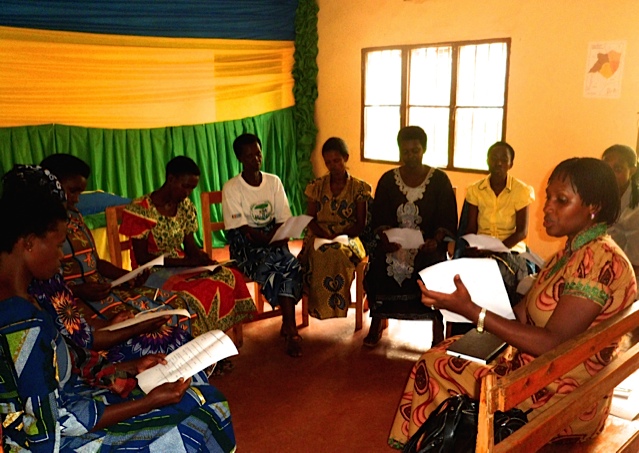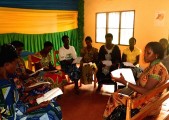
An innovative counselling project, that delivers support through a community approach to women with children born of rape, demonstrates its success as a model of best practice for rape victims, new research has shown. It suggests that the groups, established by Survivors Fund (SURF) and Foundation Rwanda, helped to restore the social fabric destroyed by the genocide. The Community Counselling Initiative was set up as a pilot project in 2012 by SURF, and has since grown to include 30 groups, with over 300 women supported.
“Rebuilding the social fabric: community counselling groups for Rwandan women with children born as a result of genocide rape” was published in the November issue of “Intervention” the journal of mental health, psychosocial work and counselling in areas of armed conflict.
The research shows how SURF’s programme is an effective means to supporting some of the most damaged women who suffered the atrocities of 1994. Chief Executive of SURF, Françoise Lemagnen, commented: “I hear some people saying that 20 years on women should ‘get over it’. This is a harsh and misinformed assessment of the pervasive and long-lasting effects of the 1994 genocide rape campaign. In an era of global conflicts, where women and children are systematically targeted, projects such as the Community Counselling Initiative provide us with tools to individual and collective rebuilding and hope for the future”.
SURF’s Community Counselling Initiative, via their Foundation Rwanda Programme specifically created for women with children born from rape, is an innovative project started in 2012 in order to create community counselling groups for women with children born from rape. Four pilot groups were established to support the women to get together, share experiences and receive support from each other facilitated by trained counsellors. The project has since expanded and led to many more women being helped, with 30 groups established and over 300 women receiving support.
- SURF Community Counselling Group, 2014
The project included in-depth monitoring and evaluation, surveying the women before, during and after working in the counselling groups. This provided the ability to track the changes in their circumstances and monitor healing, while also providing feedback to ensure that the counselling groups were having a positive impact and were helpful to the women. The results from the evaluation were highly positive and demonstrative of the impact the counselling groups had in the lives of participants.
The research also demonstrates the complex and often unaddressed challenges that women with children born from rape continue to face in Rwanda, and the on-going need for community counselling initiatives. It also provides other INGOs and professionals with the learning and methodology of the project, so that the innovation can be shared and replicated.
In the study, the life satisfaction of the women improved over the time they participated in the groups. On average, the women rated their life as 2.8 out of 10 prior to being a part of the group, while at the end of the counselling, they reported an average of 8.6 out of 10 in life satisfaction. The women also reported having an increase in the number of people in their lives who they have for support, became more accepting of their role as a parent of a child born from rape and improved relationships with their child. When speaking with SURF and Foundation Rwanda staff at the groups’ conclusion, the mothers explained that the groups reduced isolation and allowed them to connect with others in a similar situation.
As one woman explained: ‘I always thought that I was the only one suffering from having a child that was born out of rape, but after our group discussion, I got to know that it is no longer my concern as an individual but our concern as a group. Sharing our experiences gave me more hope and strength.’
These women, who were previously marginalised, stigmatised and alone in their trauma, were able to build their confidence and self esteem, increase their knowledge, enhance positive emotions and reduce shame. The counselling groups also helped to improve relationships with their children and family.
Intervention, published thrice yearly, is an international multi-disciplinary journal of mental health, psychosocial work and counselling in areas of armed conflict. The audience includes mental health workers such as psychiatrists, psychotherapists and psychiatric nurses, and also for counsellors, psychosocial workers and community workers, staff members of NGO’s developing mental health or psychosocial projects, and international experts in the field. Intervention is a publication of the War Trauma Foundation.
Published: Intervention, November 2014, Volume 12, Number 3, Pages 393 – 404
Authors: Jemma Hogwood, Carl Auerbach, SamMunderere & Emilienne Kambibi
About the principal authors: Dr. Carl Auerbach, is a Professor of Psychology, at the Ferkauf Graduate School of Psychology,Yeshiva University, NewYork, USA. Dr. Jemma Hogwood, is a Clinical Psychologist with Survivors Fund, based in Kigali, Rwanda

